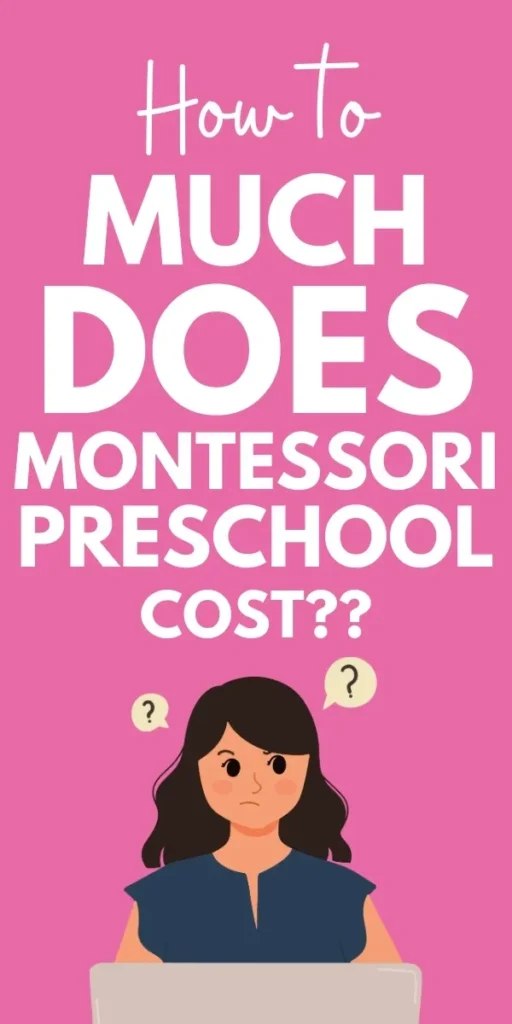The “Montessori” label evokes images of beautifully prepared environments, self-directed learning, and blossoming independent thinkers.
But amidst the allure, a crucial question arises: how much does a Montessori preschool actually cost?
Understanding the factors that influence the price tag and navigating the financial landscape can be daunting.
This guide aims to demystify how much montessori preschool cost, providing parents with clear information and valuable insights to make informed decisions.
Table of Contents – Montessori Preschool Cost Reveled
How much does Montessori preschool cost? – A Quick Answer
Montessori preschool costs can vary significantly depending on location and specific school programs.
In 2024, the average cost of a Montessori preschool or kindergarten program for a toddler ranges from $9,750 to $15,300 annually.
The monthly breakdown for a Montessori program could cost as much as $1,527 for infants, $1,214 for early childhood students, and $1,524 for secondary students.
Unveiling the Price Spectrum:
Firstly, there’s no one-size-fits-all answer. Montessori preschool costs vary widely depending on several factors:

Location, Location, Location:
- Urban vs. Rural: Metropolitan areas generally boast higher costs due to increased land prices and operating expenses. Rural settings often offer more affordable options.
- State and Regional Variations: Cost of living, regulations, and availability of Montessori programs can all impact tuition fees.
Exploring the Program:
- Full-Day vs. Half-Day Programs: Full-day programs understandably cost more, with half-day options offering a budget-friendly entry point.
- Independent vs. Public Montessori Schools: Independent Montessori schools are primarily self-funded, leading to higher tuitions compared to public programs with partial subsidies.
Additional Fees and Considerations:
- Registration Fees: Most schools charge a one-time non-refundable registration fee to secure a spot.
- Materials Fees: Some schools charge additional fees for specialized materials used in the classroom.
- Lunch Programs: Optional lunch programs add to the overall cost.
- Transportation: Consider potential transportation costs if the school doesn’t provide bus services.
Unveiling the Numbers:

Now, let’s delve into the actual figures:
- National Average: According to National Center for Montessori Education, the average annual tuition for a full-day Montessori preschool program in the U.S. falls between $9,750 and $15,3001.
- Range of Estimates: Depending on the factors mentioned above, costs can range anywhere from $5,000 to $30,000 per year.
Understanding the “Why” Behind the Price:
Higher costs in Montessori programs often reflect:
- Smaller Class Sizes: Individualized attention and personalized learning require smaller student-to-teacher ratios, increasing staffing costs.
- Specialized Materials: Montessori environments necessitate unique and carefully curated materials, contributing to higher operational expenses.
- Teacher Training: Montessori teachers undergo rigorous training and certification, impacting operational costs.
Beyond the Numbers: Financial Aid and Affordability:
Montessori education recognizes the importance of accessibility and offers various options to ease the financial burden:
- Scholarships and Financial Aid: Many schools offer scholarships or financial aid programs, particularly for those facing financial constraints.
- Payment Plans and Installments: Several schools offer flexible payment plans and installment options to spread the cost over a longer period.
- Public Montessori Programs: Explore the availability of public Montessori programs within your school district, which offer subsidized tuition.
Making Informed Decisions: Beyond the Sticker Shock:
While the cost might seem daunting, consider the value proposition of Montessori education:
- Strong foundation for academic success: Montessori programs foster problem-solving, critical thinking, and independent learning skills, preparing children for future academic endeavors.
- Holistic development: Montessori education focuses on social, emotional, and physical development alongside academics, nurturing well-rounded individuals.
- Lifelong benefits: The skills and independence fostered in Montessori environments positively impact children throughout their lives, often translating into increased confidence and self-directed learning.
Weighing the Options:
- Compare Costs: Research tuition fees and additional costs across different Montessori and traditional preschools in your area.
- Explore Financial Aid: Actively seek scholarship opportunities and inquire about financial aid programs offered by schools.
- Consider Value vs. Cost: Weigh the long-term benefits of Montessori education against the financial investment, considering potential savings in academic support or extracurricular activities later.

Conclusion: How Much Does Montessori Preschool Cost?
Unveiling the cost of Montessori preschool is like unpacking a treasure chest; understanding the factors involved reveals not just dollar figures but the underlying value and opportunities.
While the price tag might initially seem high, considering the holistic benefits, personalized learning, and potential for academic and future success, the true worth of Montessori education extends far beyond a simple financial exchange.
So, dive deeper, explore your options, and remember, investing in your child’s education, especially one that fosters lifelong skills and confidence, can be one of the most valuable investments you’ll ever make.
Also Read:
- How To Become Montessori Teacher? (A Comprehensive Overview)
- Is Guidepost Montessori Accredited? (A Quick Answer)
- Is Pre-K Free?
- Are Montessori Schools Non Profit? (A Closer Look)
- Are Montessori Fees Tax Deductible? (A Comprehensive Overview)